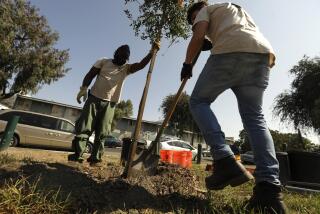Cloudy skies for L.A.’s solar efforts
When he was running for mayor seven years ago, Antonio Villaraigosa promised to make L.A. the greenest big city in America. Yet when it comes to local solar-power development, it’s not even the greenest city in Los Angeles County.
Rooftop solar panels make a lot of sense for L.A., not only because the city is so frequently sun-splashed but because local power development is the easiest and cheapest way to reduce reliance on fossil fuels, since one doesn’t need to build power lines to carry electricity here from desert solar plants or mountain wind farms. Compared to other cities, though, L.A. is lagging. A statewide analysis by the advocacy group Environment California found that while Los Angeles is No. 2 in the state in terms of the total amount of solar power generated, that’s only because the city is so huge; when it comes to per-capita solar development, L.A. is dwarfed by Northern California cities such as Chico and Santa Rosa. San Diego has more installed solar capacity than L.A. even though it has roughly one-third of L.A.’s population. And Burbank residents are about five times more likely to live or work at a facility powered by the sun than L.A. residents.
So what’s the holdup? Times staff writer Catherine Saillant got some of the answers from business owners who have made the jump to solar in L.A., only to discover it’s a cumbersome and expensive process plagued by delays, poor service and bad communication by the Los Angeles Department of Water and Power, which despite initiatives such as Villaraigosa’s Green L.A. action plan seems to have long regarded rooftop solar power as an annoying stepchild.
Ron Nichols, the latest chief of the turnover-plagued DWP, vows that’s a thing of the past. And the City Council deserves some credit for recently acting to speed solar development by approving a “feed-in tariff” program, which would allow owners of warehouses and apartment buildings to install panels on their rooftops and sell the excess power they generate back to the DWP, giving them a chance to pay off their investments and potentially make a tidy profit. Yet the program is limited to only 10 megawatts to start, a notably unambitious goal given L.A.’s potential.
That’s in keeping with a DWP approach that has barely kept up with state renewable-power mandates, let alone broken new ground. A pair of state laws, including former Gov. Arnold Schwarzenegger’s heralded “Million Solar Roofs” initiative call for L.A. to generate 355 megawatts of solar by 2016, nearly a 10-fold increase in just four years. Nichols has acknowledged the DWP won’t reach that goal, and as a publicly owned utility it won’t face any financial penalties for its failure. Yet it’s an embarrassment for L.A. and a black eye for its leaders.
ALSO:
Hard time for stealing a soft drink
Are illegal immigrants taking Mitt Romney’s advice?
Cut Social Security and Medicare? Sure, after the last boomer is dead
Follow Dan Turner on Facebook.
More to Read
A cure for the common opinion
Get thought-provoking perspectives with our weekly newsletter.
You may occasionally receive promotional content from the Los Angeles Times.










